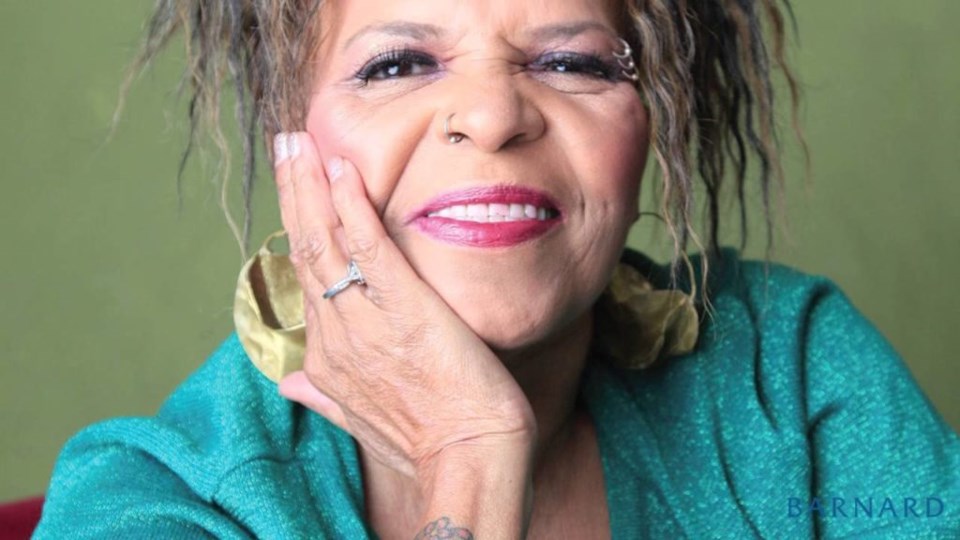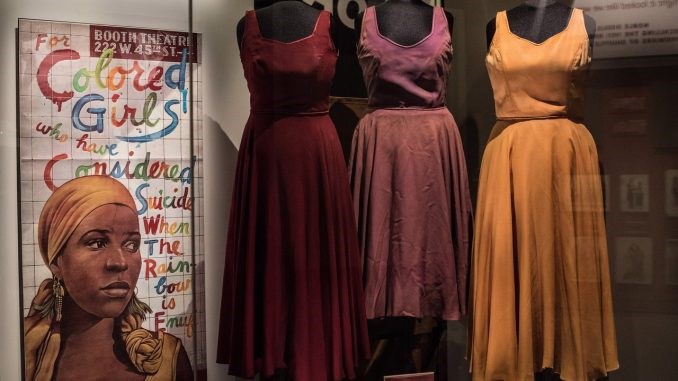By: Dr. Brenda M. Greene
Renowned poet, playwright and novelist Ntozake Shange's Obie Award-winning choreopoem for colored girls who have considered suicide / when the rainbow is enuf, first produced in 1974, boldly defined what it meant to be a woman of color in the 20th century. Her works include Some Sing, Some Cry (2010), which she co-wrote with Ifa Bayeza, Betsey Brown (1985) and Sassafrass, Cypress and Indigo (1982). Among her honors and awards are fellowships from the Guggenheim Foundation and the Lila Wallace-Reader's Digest Fund.
In this interview conducted with Dr. Brenda Greene, Shange reflects on her creative process, voice, race and ethnicity in her work.

Brenda Greene
I want to talk to you about the power of voice in your work. In your poetry, prose and books, you celebrate the voices of women. I would like to start off by talking about for colored girls who have considered suicide when the rainbow is enuf. Why was it so important to write this book, which celebrated the voices of Black women?
Ntozake Shange
It's difficult to approach. I wrote twenty poems over a period of two and a half years. They were poems I read at readings, in different arrangements and with different nuances, dancers and musicians. We were able to discover elements in the poems and in the music and dance that allowed us to present it to one audience and tradition. I had developed an audience in the San Francisco Bay area, but it never occurred to me that it was going to the world. It was going to my community, which I was apart of and where I felt I belonged. I think some of the confidence and the buoyancy of the language comes from that feeling. And I never felt like we had to do anything else. We had this to do. And that was what I could do and that's what I did.
Greene
But why was it important from your perspective to get those stories out, to get those words out?
Shange
That's what I do.
Greene
Who are the literary voices, the music and the songs that influence the ways that you write?
Shange
I'd say Max Roach, Beny Moré, Archie Shepp, Yusef Lateef, Willie Colon, of course, and innumerable musicians. In terms of writers, Amiri Baraka and Zora Neale Hurston, and
Greene
Is there anything particularly striking about those particular writers and the work they produce?
Shange
Yes, they were written in the language of the people, so that there was a specific voice, a specific accent, a specific dialect for every person in every area. I knew that; I grew up around that; I heard lots of specific Black accents as I grew up and I heard lots of different white people talk, so I could hear them.
Greene
You made me think about the fact that much of your writing uses dialect and Black English vernacular. Do you make a conscious choice to do that?
Shange
Yes. We don't all sound alike.
Greene
It relates back to the themes and voice in your poetry and plays. Your themes celebrate women and you make sure that women have a space to tell their stories. I think about the line in the poem, somebody almost walked off wid alla my stuff. You ask why you keep taking my stuff and why you don't find your own things. You remind women that they have to hold on to their own things, their own space and their own voice. There's power in that. Why is this such an important point for you?
Shange
The voices are all me. The voice could be a lady across the street calling her son. That might open up a whole new story or a new vignette. I look at people sometimes and look at them and watch them for a while and imagine how they talk and sometimes I don't actually hear them talk. I make up how they talk, how they dress and how they treat their children.
Greene
What are the differences between writing plays and writing poems?
Shange
There aren't. That's one of the reasons that the material keeps going back and forth. I have always been a performing poet, whether it was a novel or short story or a poem, I always had to perform it because that's what I wanted to do.
Greene
Also, dance is very important in your work. You really blur those boundaries.
Shange
Yes, I was involved in dance seriously for about ten or fifteen years. I stayed in New York and San Francisco. I had excellent teachers and a cadre of dancers who were my friends and colleagues for years and who still are. I am getting ready to go to see the person who co-created the choreopoems, Paula Moss. She's in Rome. We haven't seen each other in years. It's been a few years now and I am going to give her a DVD of the film.

Greene
Let's talk about the film. What are your impressions with what Tyler Perry has done with your work?
Shange
I thought Mr. Perry did an eighty-five percent satisfactory film. I thought it was very interesting how he handled some of the material. I think he did as well as he possibly could without betraying the work, although there are some people who still think that he did betray the work. But I don't think he betrayed it. I think he did the most he could. He got excellent work from the actresses. The actresses are superb. For that alone, it's a significant piece of work.
Greene
Your subjects are always Black.
Shange
Yes, and also Latino and there are some Asians in my work.
Greene
We live in a society constructed by race. In what ways do you think that the culture and society we live in help you to choose the kind of poems, plays, essays, and stories that you are drawn to and that you choose to write? In other words, how do race, ethnicity and gender impact the kind of writing you produce?
Shange
I think I am pushed toward a subject or a character because I'm pushed that way. I encounter various kinds of racism and sexism on a daily basis like any other woman of color. And I have to transfer that into something interesting and delightful for my readers. It is not easy to make racism delightful. So that's what the hard part of my job is, finally, making people laugh or making them cry, without turning myself into a batting ball. But I'm pushed to do something by something that happened in the world.
Greene
I read that you said that writing about critical issues through the creative process, such as through poetry or performance, is much more appealing than presenting the hardcore facts around particular issues.
Shange
That's true.
Greene
Can you talk about your creative process? You do represent where the arts are now. You've blurred all the boundaries in dance, music, poetry and drama. You are truly the artist in all forms.
Shange
I would suggest that you continue learning. Two years ago, when I was more seriously disabled, I took a class in foundry work because I couldn't read and write. I could hear and understand but I couldn't necessarily understand the alphabet. I would look at a word and it wouldn't register as a word. Or I wouldn't be able to say to you this is a "w." I just couldn't do it. So I decided that I have to do something. I knew that I was still a creative person. I just didn't know what I could do. I asked my associate Claude to look through the newspaper for me, in the alternative newspaper, and he found a wonderful alternative art school for adults. There was a foundry class. Metalwork, I said. That would work. I've always loved foundry work. I was using a walker at the time and I said to Claude, "Take me down there and let's see if I can do this." We got to the foundry. It was called the Crucible. We enrolled and I made two statues. (Ntozake showed me one of the masks).
Greene
That's a beautiful mask. Even in your artwork, you go back to the ancestors. The Africanisms are present in both your written art and visual art. What advice would you give to emerging writers about the creative process and your creative process?
Shange
My initial advice would be to keep a journal every day, if only for fifteen minutes a day.
That's very important. I had a fabulous teacher when I was in college and he encouraged us to write about a book we had read every time we finished one. That's another thing I would suggest that all artists do. Keep learning if you don't know about something. For instance, Sassafrass is a weaver and Cypress is a dancer and Indigo is a violinist (characters in her novel, Sassafrass, Cypress and Indigo).




